Comments on and descriptions of everyday family life in a tropical country, plus other interesting stuff that takes my fancy. May contain explicit sexual material so if you are offended by such or under the legal age, please leave now.
Monday, January 30, 2006
Cartoons of Mohamed rouse the faithful
Caricature is but one method of attacking pomposity and falsity. It seems to be the most effective, for it draws more fire from Muslims than even the most vitriolic direct attacks, which can easily be ignored.
Friday, January 27, 2006
An excellent comment on the Palestinian election, from The Guardian,27 Jan 2006
The excuses given for refusing to deal with Hamas will not wash. This is a chance for Europe to have an independent role
Jonathan Steele
Friday January 27, 2006
Guardian
Hamas's triumph in Wednesday's Palestinian elections is the best news from the Middle East for a long time. The poll was a more impressive display of democracy than any other in the region, outstripping last year's votes in Lebanon and Iraq both in turnout and the range of views that candidates represented.
Whereas in Iraq parties that opposed the occupation had to downplay or even obscure their views, Palestinian supporters of armed resistance to Israel's expansionist strategies were able to run openly. It is true that Hamas candidates did not make relations with Israel the centrepiece of their campaign. They focused on reform in the Palestinian Authority. But few voters were unaware of Hamas's uncompromising hostility to occupation and its record in fighting it.
Wednesday's election was remarkable also in owing nothing to Washington's (selective) efforts to promote democracy in the Arab world. Instead, it was further proof that civil society in Palestine is more vibrant than anywhere else in the region and that Palestinian politics has its own dynamics, dictated not by outside pressure but the social and economic demands of ordinary people in appalling conditions. Providing a forum to freely express hopes and fears, debate policy and seek agreed solutions is, after all, what democracy is about.
In Israel and Washington reaction to Hamas's victory has been predictably negative. European governments should take a more sensitive view. The first watchword is caution. Applaud the process but don't take issue with the result. While the dust settles and Hamas works out its own priorities for government, Europeans should calmly analyse why Hamas got so much support.
Among several Hamas leaders I met in Gaza last summer, Mahmoud Zahar, one of its last surviving founders, exuded the clearest sense of inner steel. Trained as a medical doctor in Cairo, and now a short middle-aged figure with combed-over grey hair, he left several impressions. This is no mosque-driven revolutionary or wealthy jihadi of the Osama bin Laden type, motivated by ideology or a desire for adventure. Like other Gazans, he has felt the occupation on his skin. His wife was paralysed and his eldest son killed by an Israeli F-16 attack on his house in 2003. Zahar was in the garden and lucky to survive. In spite of that, he took the lead last year in persuading colleagues that Hamas should declare a truce or period of "calm" with Israel. For 11 months no Hamas member has gone on a suicide bombing mission. That is no mean achievement, which foreign diplomats rarely credit.
Zahar's reasons were not just tactical - a desire to deny Sharon a pretext for abandoning his retreat from Gaza. His strategy is to de-escalate the confrontation with Israel for a long period so that Palestinian society can build a new sense of unity, revive its inner moral strength and clean up its institutions. He feels western governments give aid and use the issue of negotiations with Israel only as a device for conditionality and pressure, not in the interests of justice.
So he wants Palestinians to have a broad-based coalition government that will look to the Arab and Islamic worlds for economic partners and diplomatic support. It's a kind of "parallel unilateralism", matching the mood in Israel where the peace camp clearly has lost all real purchase. "Israeli attitudes show they don't intend to make any agreement. They're going to take many unilateral steps," Zahar told me. "In this bad unbalanced situation and with the interference of the west in the affairs of every Arab country, especially Syria and Lebanon, we can live without any agreement and have a 'calm' for a long time. We're in favour of a long-term truce without recognition of Israel, provided Sharon is also looking for a truce. Everything will change in 10 or 20 years."
Zahar also left me with no sense of embarrassment about the imminence of power. He pointed out that Mahmoud Abbas would remain president for three more years, as though implying he could be a convenient front for inevitably unproductive talks with Washington and Israel while Hamas acted as a watchdog on the main issues. "There will be no contradiction between the Palestine legislative council and the president," he said. "We will be the safeguard, and the safety valve, against any betrayal."
Along with caution in reacting to the Hamas victory, Europe's second priority should be to maintain continuity. Any cut-off in EU aid would only be a gift to Israel's hardliners. The EU is the largest international donor to the Palestinian Authority, and Javier Solana, the EU foreign policy chief, blundered last month when he told a Gaza press conference that "it would be very difficult for the help and the money that goes to the Palestinian Authority to continue to flow" if Hamas were in government.
Yesterday's EU statements were more measured. If Europe, weak though its power may currently be, wants to have an independent role in the Middle East, clearly different from the manipulative US approach, it is vital to go on funding the PA regardless of the Hamas presence in government. Nor should the EU fall back on the cynical hope that Hamas will be as corrupt as Fatah, and so lose support. You cannot use European taxpayers' money to strengthen Palestinian institutions while privately wanting reforms to fail. Hamas should be encouraged in aiming to be more honest than its predecessors.
Above all, Europe should not get hung up on the wrong issues, like armed resistance and the "war on terror". Murdering a Palestinian politician by a long-range attack that is bound also to kill innocent civilians is morally and legally no better than a suicide bomb on a bus. Hamas's refusal to give formal recognition of Israel's right to exist should also not be seen by Europe as an urgent problem. History and international politics do not march in tidy simultaneous steps. For decades Israel refused even to recognise the existence of the Palestinian people, just as Turkey did not recognise the Kurds. Until 15 years ago Palestinians had to be smuggled to international summits as part of Jordan's delegation. It is less than that since the Israeli government accepted the goal of a Palestinian state.
Hamas may eventually disarm itself and recognise Israel. That will be the end of the process of establishing a just modus vivendi for Israelis and Palestinians in the Middle East. It cannot be the first step. Today's priority is to accept that Palestinians have spoken freely. They deserve respect and support.
j.steele@guardian.co.uk
Monday, January 02, 2006
A trip into the past - with updates. A large part of this information, except of course the photos, I have got from public records via the internet.
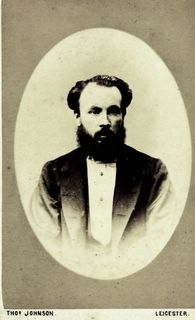
Augustus Kirk 1838-1923

I've been delving into the lives of some of my ancestors recently. My grandfather Augustus Kirk was born in 1838 and he had a milliner's shop in Leicester, a fair sized city in the English midlands. His shop was in the High Street, employing ten assistants and an apprentice. He also employed a general servant and a nursemaid.
Augustus married Clara Weston,
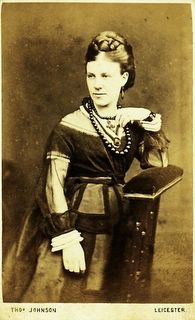
Clara Kirke (nee Weston) 1844-77

a pretty woman six years younger than him, in September 1874 and had two children – my father and his younger sister Iva. I have no photo of Iva, but here is my father:
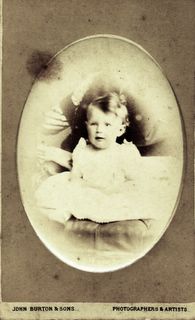
Cecil Kirke about 1876

Dad was born in June 1875 and his sister Iva in May 1877.
Sadly, Augustus' young wife Clara died less than a month after giving birth to Iva – perhaps from puerperal fever, a common thing in those days. Augustus was left with the task of bringing up two very small children with the assistance of their nursemaid Eliza Adams.
Fortunately for him and for the children, Augustus' sister Olivia,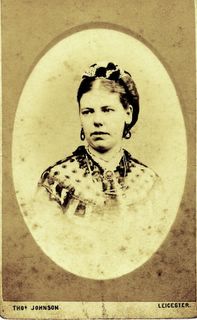
Olivia Kirke, 1837-1909 (later Olivia Gilson). 
a year or two older than him at age 40, lived with them, and she took over the mothering. Olivia was unmarried, although a good looking woman, and the family grew up over the shop in Leicester High Street until my father was thirteen, when Olivia then aged almost 52, received a proposal of marriage from a well-to-do farmer in Twyford, a village a few miles out of Leicester. His name was John Doughty Gilson, a widower then aged about 67, whose first wife, Catherine (known as "Kate") had died the year before aged 64, having given him five children.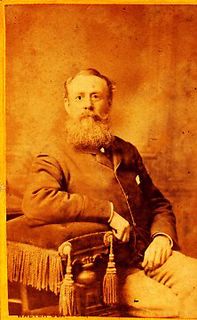
John Doughty Gilson about 1870-80 
and he farmed 170 acres of land with the assistance of five labourers and a boy.
Olivia and John were married in early 1889, and my father and his sister Iva moved out of Leicester to live in the farm house at Twyford with Olivia and her husband.
Here it becomes complicated. It is possible that John D. Gilson was a cousin of Augustus, as his great-grandmother was Mary Doughty and Augustus' great-aunt Catherine Kirk, daughter of Mary Doughty, born 1788, married one William Gilson, born 1780. John may well have been the son of William Gilson (the evidence for this is purely circumstantial, but the name "Doughty" supports this). John would then have been Olivia's first cousin once removed, or “niece in cousinhood” as they say in some parts of the world, and John's sons would be Olivia's second cousins.
To back up this speculation, Catherine died in Twyford on 9 April 1865. Olivia's great-aunt may have become her mother-in-law!
Olivia's marriage did not last long. Tragedy again overtook the family and John Gilson died after less than a year of marriage, leaving his sons Arthur, Alfred and Herbert (young men in their twenties) and, possibly, a daughter, of who I have a photo captioned, tantalisingly, “S. Gilson”. That this young woman is John Gilson's daughter is guesswork on my part.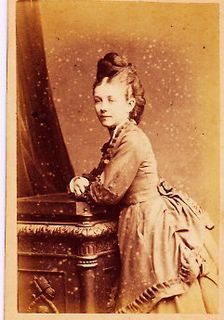
Selina Gilson 
In this photo she is a pretty young woman (difficult to guess her age), and I can find no other information about her. I am guessing that her first name was probably Sarah, as there were many Sarah Gilsons around that neighbourhood at that time.
Note: Since I wrote that last sentence, I have found out that John D. Gilson had two daughters; one, Selina, born in 1858. this would make her about 20 when the photos were taken, and fits exactly with them, so I am sure she is John's daughter - Olivia's stepdaughter and Dad's step-cousin.
Selina married twice, but so far as I can find out had no children. Her first husband was a lace maker from Nottingham, John Steere Hardy, and she lived with him in Nottingham for fourteen years. After he died in late 1891, she married again two years later to James Neville Tompson, a commercial traveller in timber, also living in Nottingham, and she lived there with him. Less than six years later she died aged just 42 and was buried in Wollaton Road Cemetery. She was my second cousin twice removed.
I also found out that John was described in the 1851 census as a "farmer of 83 acres employing 2 labourers", and in the1871 British census as a "grazier, 80 acres". So he had expanded his farming business by 90 acres and several men in the ten years between 1871 and 1881.
Here is another photo of Selina: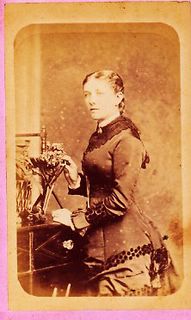
Selina Gilson about 1870-80 
After her husband's death Olivia and the two children returned to Leicester and in 1891 they were living with Augustus at 19 St. Nicholas Street, Leicester. I guess the two sons had been bequeathed the farm, and probably John had left Olivia some money. Augustus had evidently sold his millinery business and was "living on independent means" according to the 1891 Census report. He does not seem to be employing any live-in servants, but a niece of his wife, Florence Mastyn or Mastin, aged 23, is living with them as housekeeper
Some time between 1891 and 1901 Augustus, Olivia and Iva moved to 39, Nightingale Lane, Streatham (then a suburb of London), where Olivia died on 19 October, 1909, aged 72.
Dad's sister Iva married a clergyman, John Anthony Sturton, and he obtained the position of Vicar at Market Lavington in Wiltshire (his father was a clergyman, too.) I still have a pocket Bible he gave me as a christening gift. They lived in the big Vicarage house in the village, and Augustus moved there (I don't know the exact date) and the Vicarage became home for my father's children by his first marriage - though they did visit him in China on occasion. Augustus died there in 1923 and was buried in St. Mary's churchyard there. I still remember that big old house in its large garden: in about 1978 it appeared much as it had been in my childhood forty years earlier; but the Vicar's residence is now elsewhere.
Dad went on to join the China Consular Service in 1898, first as an interpreter, later appointed vice-consul and in due course posted to many different towns in the course of the years 1906-1932 finishing his career as Consul-General for the provinces of Yunnan and Kweichow. from 1927-1932.
He married first Mabel Wilson from Alnwick, Northumberland: she died at sea in 1927 after giving him two sons and two daughters; two years after her death he married my mother, Sybil Sandys, a missionary working for the Church Missionary Society and a descendant of the seafaring families of Hood and Nelson. I was born in China and left that country at the age of two.
Sybil Kirke (nee Sandys) 1900 - 1989
Dad retired in 1932, and died in 1959. His beloved sister Iva, with whom he had a closer and more durable relationship than with either of his wives, died a year before him and he told my mother shortly before his death that he was not afraid to die, as his sister Iva had appeared to him and she had told him she was waiting for him. He was buried in the churchyard at Market Lavington near his father's grave.
To finish off, here is a photo of my great-grandfather William Henry Kirk, Augustus' father:
There is also some more information that has come to hand about my great-grandfather William Henry Kirk. In the 1861 census he is described as "Artist and Woolsorter", living at 20, Friar Lane, Leicester. Wool production was a substantial industry in Leicestershire at that time. Probably John D. Gilson had many sheep.His two children and his "niece" (probably 2nd cousin once removed) Ellen (or Eleanor) lived there with him.

